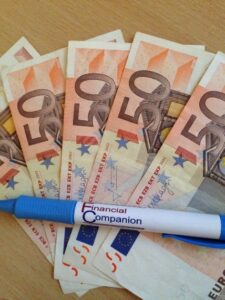Every choice you make, every activity you do, every change you contemplate, are in some way connected to your finances. You have income. You have expenditure. The aim is that the first one is always greater than the second, that leaves you with “disposable income”. Budgeting smarter can help you improve this.
For most people, the income side is relatively constant. So how can you improve the amount you have left over? On the spending side. The first thing to realise is that most people don’t accurately know the full details of their expenditure. They’ll know some of the main and regular ones, but not all. You can test this by trying to list everything that you spent last month, then look at what you actually spent. They will rarely match. (Think of the last time you took €50 out of an ATM and bought a bottle of wine, for example. What did the rest of the €50 go on?) So the first step is to undertake a strict monitoring of spending for a month. Every cent spent on anything, whether cash, cards or direct debit. Log it every evening. After a month, you’ll have something to work with. The first thing you will usually notice is that you spent money on things that you really did not need to (and often wish you hadn’t!) This can help moving forward with reducing spending. But what else can you do? A few tips to cut spending further and hence, improve how much you have left over each month:
Carefully study 3 months’ bank statements. Make sure that you can account for every single transaction. On a regular basis, I encounter people who have been paying for things that they should not be. Direct debits they forgot to cancel. Subscriptions no longer relevant. Doubling up on things like house insurance (happens a lot!).
Make a detailed list for grocery shopping (and don’t shop while hungry). This leads to only buying what you actually need, a lower bill at the till and less throwing out of food gone off. Also, check your receipt after going through the till. “Accidental” over-charging is far more prevalent than you may realise. (Since I began keeping record, one store has overcharged me 65 times!)
Compare before you shop for larger items. Just because one store has a fridge you want, reduced from €950 to €850 in their “Sale”, does not mean another store nearby that does not currently have a sale on, is not selling the same one for €799. A little research can produce big savings.
Compare utility providers. Whether it’s electricity, gas, broadband, mobile phone service or similar, there can be substantial savings to be had by switching to better deals.
Check when car/house insurance renewals arrive. Don’t automatically accept a renewal premium without checking around. A few phone calls could save you hundreds of euro.
Review premiums on life cover/mortgage protection. Especially if you arranged it directly with a bank or insurance company that could only quote you for their products. Massive savings can be made doing this, as you pay for them over such a long period.
In all my years of helping people with their finances, I have never seen anyone NOT make savings by doing the above. If anyone would like the free budget spreadsheet in excel format that will calculate totals as you input them, just email info@financialcompanion.ie with Budget in the subject line. Happy saving!
Dave Kavanagh QFA has been a Financial Adviser for over 20 years (and a Gym Instructor/Nutrition Adviser before that!) He has done advice slots on on RTE 2FM, LMFM and on TV3 and does the “Ask the Expert” Financial Advice section on Mumstown.ie For more information on this topic, just send an email and remember, with Financial Companion, there is no cost and no obligation to arrange a review. Contact us to find out how simple it is.





